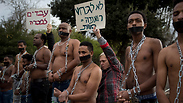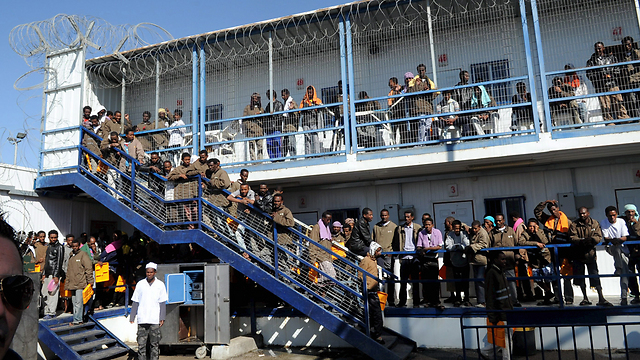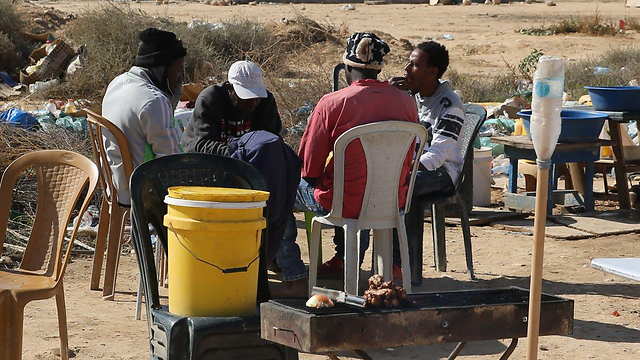

Activists weigh marrying migrants to prevent mass expulsion
Poet and activist Ayala Ring says new tactic to prevent government's plans to expel illegal African migrants began as a hypothetical idea but has 'raised awareness' in public circles of their plight; PM: 'We're acting against illegal migrants who come for work needs.'
Activists opposed to Israel’s planned expulsion of African illegal migrants are considering adopting a new strategy that would involve marrying them to block the government from carrying out the program.
“We’re disgusted by the treatment that refugees receive and we want to save them. It started as a hypothetical idea, in order to raise awareness,” explained Ayala Ring, a poet and activist seeking to quash the governmental scheme that would see illegal migrants receive cash handouts to leave the country or face imprisonment.
At the beginning of January, Israel notified thousands of Africans who entered the country illegally that they have three months to leave or face incarceration.
The Population and Immigration Authority called on migrants from Sudan and Eritrea to leave "to their country or to a third country," meaning Rwanda or Uganda. Those who leave by the end of March will be given $3,500, along with airfare and other incentives in a bid to remove 42,000 illegal African migrants from Israel.
“We were surprised that it actually started to materialize and we hope that we won’t need to get to such an extreme measure,” Ring said during an interview with Ynet on Sunday.
Asked what she hoped to achieve by spearheading the marriage campaign, Ring said her priority was to raise public awareness.
“We are a bunch of activists in the struggle against the expulsion of refugees and obviously they are refugees, not infiltrators,” she emphasized in reference to term commonly employed to describe the migrants in Israeli political and public discourse.
“It is very, very important. Awareness is increasing and gaining momentum,” Ring said, while wearing on her white sweater a black insignia of the Star of David as a symbol of solidarity with the African migrants, evoking memory of the yellow patch Jews were forced to wear under Nazi persecution.
“I am a grandchild of refugees. My father was born in a refugee camp in Italy on his way to Israel. Part of the method of arousing awareness is also to shock and I think that in light of what is happening, we are prepared to shock people, because we ourselves are shocked by the attempted expulsions. We see this as something which is very very urgent,” she said.
Ring added that she feared some of the deportation cases would lead to the refugees’ murder. “The moment they send them away they are exposed to danger. This is punishment for refugees when they are sent from here, with death in their destination.”
Despite appeals made on humanitarian grounds in favor of offering a safe haven to the migrants, the Israeli government insists that it has every right to remove those who made their way to the country illegally, particularly through Israel’s once-porous southern border.
During his opening weekly Cabinet remarks on Sunday, Prime Minister Benjamin Netanyahu addressed the issue, arguing that many of the “infiltrators” were economic migrants rather than victims of persecution.
“I hear claims regarding the illegal migrants and our policy. We are not acting against refugees. We are acting against illegal migrants who come here not as refugees but for work needs. Israel will continue to offer asylum for genuine refugees and will remove illegal migrants from its midst,” Netanyahu said.
Attempting to debunk the claims that the deportations would compromise the migrants’ safety and security, Netanyahu listed the arrangements that had been made and the benefits they would receive upon arrival at their new country.
“They receive permits for housing, work and the chance to integrate into the country. To the extent that they desire to do so, they may even return to their countries of origin. They receive significant financial assistance from us. Do not forget that Israel invests considerable capital while they are here and for their passage to the third country,” he said.
The prime minister also highlighted that the process had been approved by the legal establishment and are under the ongoing supervision of the official representatives of Israel and the third country.
“At the same time, I have the allocation to the Interior Ministry, which the government has approved, of a special budgetary supplement to expedite the examination of requests for asylum in Israel. This policy is in complete compliance with the directives of the Supreme Court and international law; therefore, there is no basis to the claims being made against us," he concluded.


















